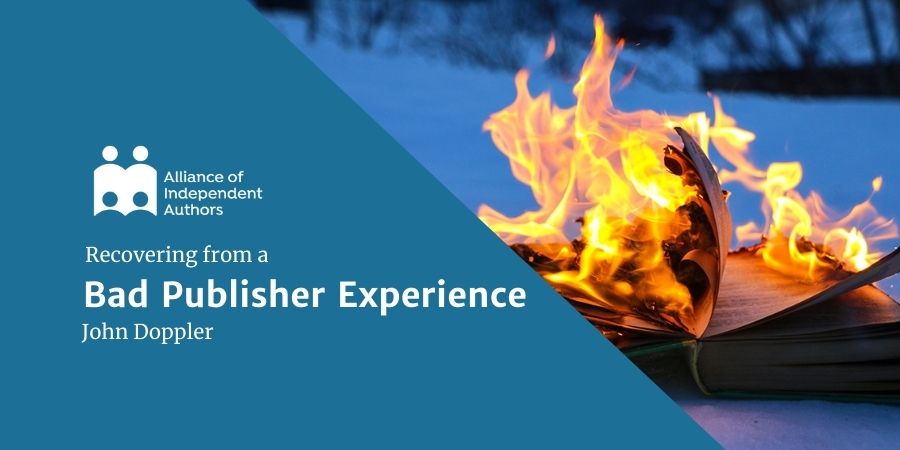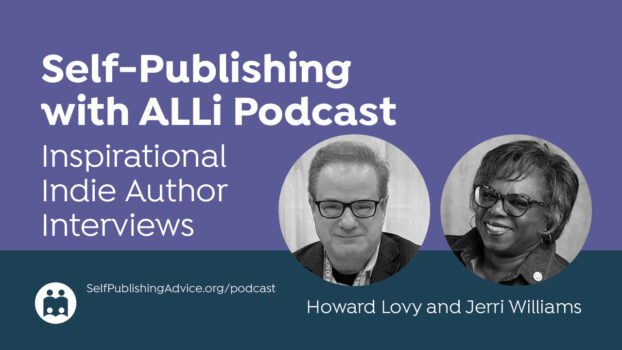Every day, an author somewhere realizes that they've been defrauded by a vanity press. Or they come to the painful conclusion that their publisher is not living up to their obligations. Or their publisher collapses and the owners vanish into the night. Today, John Doppler, ALLi's Watchdog, dives into how to recover from a bad publishing experience.

ALLi's Watchdog John Doppler
Despair is understandable. Sometimes thousands of dollars out of pocket, with their work in limbo or held hostage by an unscrupulous publisher, these authors may feel their literary ambitions have just ended.
Fortunately, that's not the case. Recovering from a failed publishing experience is not only possible, it's far easier than most suspect. And it's frequently an opportunity for authors to republish their book more professionally and profitably than before.
Breaking Ties
Depending on the integrity of the publisher and the terms of the agreement you signed, ending a relationship with a publisher can be as simple as mailing a notice of termination, or it can be a nightmare of futility and frustration.
An author seeking to republish their work will be interested in these key steps:
- Reverting rights to their work.
- Obtaining digital copies of the cover and the formatted, edited interior.
- Choosing a method for republishing the work.
- Ensuring that the former publisher is not profiting unfairly from the work.
We'll examine each of these in turn, and in the process, we will sketch out a roadmap for regaining control of your work and your authorial career.
Secure the Rights to Your Work
If your contract was non-exclusive, or has expired, you are free to publish a new edition of your book.
If your contract was exclusive, and the term of the contract has not yet expired, you are in a more difficult situation. You have several options for regaining control of your work, none of them ideal.
- You can ask the publisher or negotiate for early termination of the contract. This can be a painful option, one that requires the victim of a predatory publisher to swallow their anger and even make additional concessions, but it may be the most expedient way to reclaim your rights.
- You can wait out the term of the contract, if the contract expires after a specific period of time. Be sure to read the contract carefully and follow the procedure described in the termination clause, such as notifying the publisher in writing before any deadlines.
- You can notify the publisher that they are in breach of contract, and that you are terminating the agreement. If the contract spells out the means of terminating the contract, this is usually a matter of notifying the publisher in writing and giving them a certain amount of time to correct any breach. But if the contract is not clear, or the publisher disputes that the contract has been terminated, you may have no means of enforcing that declaration without taking them to court. If the contract is unclear, this approach can be fraught with hazards. You must take into account a number of legal concerns which vary from jurisdiction to jurisdiction, so legal counsel is recommended.
- Finally, you can sue the publisher for breach of contract. This is the absolute last resort: legal action can be prohibitively expensive, time-consuming, and frustrating when trying to serve papers on an evasive or hostile defendant. Most authors choose to wait out the term of the contract rather than engage in a courtroom battle that will cost more than the book may earn over a lifetime.
You can learn more about rights reversion in Katlyn Duncan's excellent article, The Ultimate Guide to Rights Reversion.
Gather Your Content
To republish, you will need — at the minimum — a professionally designed cover and a well-edited manuscript properly formatted for ebooks and/or print.
With a cooperative publisher and a sound contract, this is simple enough: review your contract to verify what you are entitled to, and then request them in writing from the publisher. But if the publisher is unresponsive or unwilling; if your contract does not entitle you to these materials; or if the materials are not up to professional standards, you will need to obtain new ones from a service provider or your new publisher.
Be aware that formatting of manuscripts, interior design, and cover designs may be subject to ownership claims by the publisher. As unfair as it seems, even if the publisher has breached their contract or disappeared without a trace, you may not have a legal right to the materials they have created. You will need to consult your contract to determine which materials are unambiguously yours.
Choose a Method of Publishing
Once free of the former publisher's contract, and with the rights to your book unencumbered, you are free to republish. The question now becomes, “How?”
There is a broad spectrum of publishing options available, each with advantages and liabilities. The following is a brief list of publishing options; for more information, see our Guidebook: Choose the Best Self-Publishing Services, available as a free perk to ALLi members.
Traditional Publishing
Business Model: The publisher oversees the production of the book, at no charge to the author, in exchange for most of the revenue from the book's sales.
Burden of Risk: Borne primarily by the publisher; the publisher doesn't profit unless the book sells.
Advantages: Traditional publishers handle nearly all of the publishing tasks, including cover design, editing, printing, distribution, and accounting. (Marketing, as with other publishing models, is often the responsibility of the author.)
Disadvantages: Legitimate traditional publishers are invariably flooded with submissions, and as a result, are highly selective. Experimental, controversial, or niche interest works may not find a publisher willing to take a chance on the venture. Querying is a time-consuming process that can potentially take years, if a publisher is even willing to consider the work. Authors must take care to select publishers with a proven history of quality and integrity.
Self-Publishing
Business Model: The author oversees the production of the book, and bears all the costs, but keeps most revenue from the book's sales.
Burden of Risk: Borne by the author.
Advantages: Self-publishing is easier than most novice authors realize. With polished tools from distributors like Amazon's KDP, Ingram Spark, Draft2Digital, PublishDrive, StreetLib, and more, authors can easily upload their books and walk through the process of publishing, step by step. The author is in full control of the creative and business direction of their publications, and reaps all the rewards. Further, self-publishing is a bit of a misnomer, as few self-published authors work alone: cover design, editing, and other services are routinely outsourced to experts as needed.
Disadvantages: No task in self-publishing is particularly difficult, but the tasks are numerous, and it's easy to feel overwhelmed by the seeming complexity of it all.
Assisted Self-Publishing
Business Model: Provides services for a fee. Assisted self-publishing services may offer a la carte services, or they may bundle publishing services into a convenient package.
Burden of Risk: Borne by the author.
Advantages: The author pays for clearly defined services, without the complications of an extended contract. Authors can outsource tasks to multiple experts, each of which may specialize in a particular publishing task.
Disadvantages: Higher out-of-pocket costs than traditional or pure self-publishing. Authors must be wary of fraudulent or substandard services. Publishing packages may include unnecessary services and fees.
Hybrid Publishing
Business Model: Hybrid publishers occupy a space somewhere between assisted self-publishing services and traditional publishers. They handle many of the same services a traditional publisher would, but unlike traditional publishers, charge authors a fee (ostensibly to offset production costs).
Burden of Risk: Borne primarily by the author.
Advantages: Hybrid publishers offer many of the services of a traditional publisher, potentially at a lower overall cost than assisted self-publishing, and with higher royalties than traditional publishers.
Disadvantages: Exploitative vanity presses and assisted self-publishing services may falsely identify themselves as “hybrid publishers” to legitimize deceptive practices. Authors must ensure that the benefits offered by the hybrid publisher are commensurate with the fees charged and the burden of risk assumed by the author.
Vanity Publishing
Business Model: Vanity presses are the highwaymen of the publishing industry, preying on the unwary with deceptive practices, exorbitant fees, and false promises. A vanity press profits by exploiting authors rather than selling books to readers.
Burden of Risk: Borne entirely by the author.
Advantages: None. Paying a vanity press to publish your book is a recipe for heartbreak.
Ensure That the Former Publisher Is Not Profiting from Your Work
You may wish to end the former publisher's sales of your book, especially if the parting was hostile and they no longer have the rights to sell the book. This may be difficult to enforce. Retailers and distributors must halt those sales, something they will be reluctant to do without the consent of the original publisher or a court order forcing them to do so. No company wants to take sides in someone else's dispute.
Authors are urged to file a formal copyright registration, which serves as strong, authoritative proof of ownership in the case of a dispute. Note that you should never relinquish your copyright to a publisher! When you sign a contract with a publisher, you grant them a license to print and sell your work, but the ownership of the work remains with the author. With proof of copyright ownership in hand, it may be easier to persuade retailers that you are the sole owner of the work in question.
However, even if you stop sales of the previous edition, a listing will remain on Amazon to facilitate third-party sales of used copies. This does not necessarily mean that the publisher is actively selling or profiting from the work, as many sellers claim to have used copies they don't actually possess. (When an order comes in, these third-party sellers try to obtain a copy at wholesale prices, and if a copy cannot be obtained, they simply cancel the order.)
If it's not possible to halt the previous publisher's sales of the book, or the legacy sales page remains, it's still possible to overshadow it with the new edition. You can ask Amazon to link your new edition to the previous edition, and to make the new edition the primary title. Your edition will then be the first that buyers see in search results, and the older edition will be buried under a tiny, all-but-invisible “See all formats and editions” link. Reviews and ratings from the earlier edition can be carried over to the new edition in this way, allowing you to relaunch with a significant head start in social proof.
A New Start, and New Opportunities
If a publisher has failed you, know that you are not alone. It's virtually a rite of passage: countless authors have experienced it, and haved moved past that temporary setback into a thriving career.
Learn from the experience, and seize the exciting new opportunities that have just opened up for you!
Want to learn more? ALLi offers a wealth of information about any aspect of publishing. Our Ultimate Guide series delves into the details of print publishing, distribution, discoverability, and more. The Watchdog Desk provides advice and ratings to help authors find the best publishing services. And an ALLi membership gives you access to our lively author forum, free author advice guides, contract vetting, and the collective experience of our successful authors and advisory staff.




